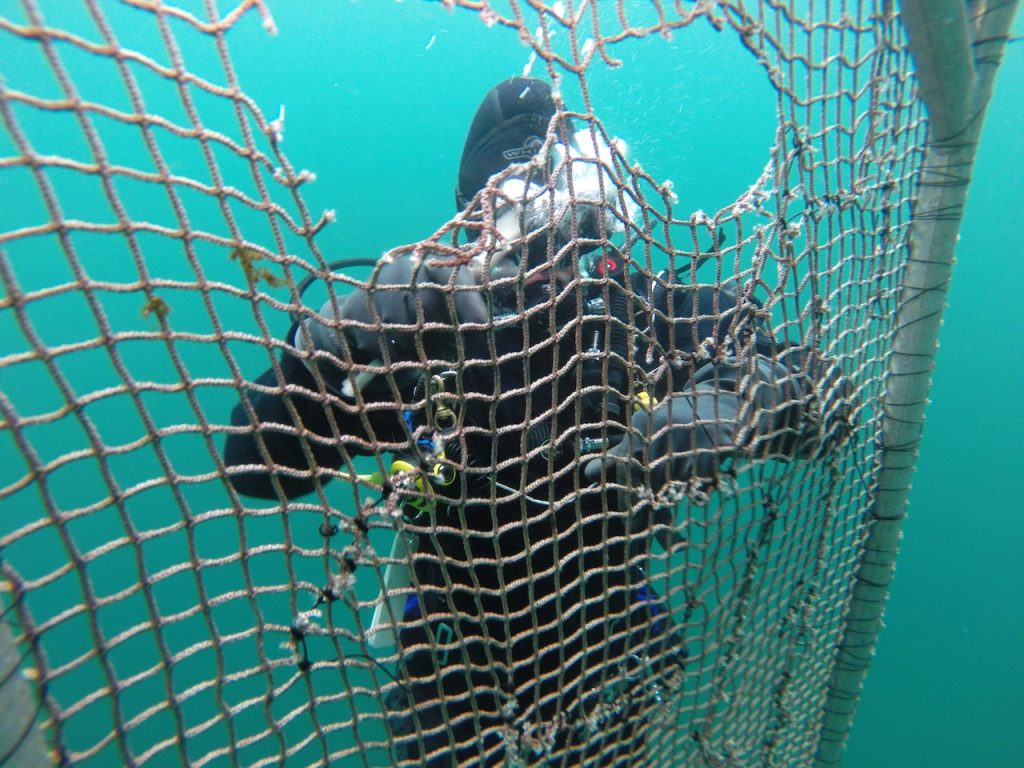
Due diligence for the most dangerous job on the farm
October 28, 2014
By Kelly Korol
 Aquaculture operations across North America look to the CSA (Canadian Standards Association) Standards for creating a code of practice for diving.
Aquaculture operations across North America look to the CSA (Canadian Standards Association) Standards for creating a code of practice for diving.Diving is an essential part of most aquaculture operations and without question the most dangerous job on the site is held by the dive crew. Not only do the divers have to deal with the typical muscular/skeletal injuries to which other farm workers are subjected, they also have to cope with decompression sickness, lung over pressure injuries, and the real possibility of drowning.
As a manager, owner or shareholder we hope and trust that the dive crews are doing things right but it’s always a worry about getting that dreaded phone call that an accident has occurred. Our immediate response is to care for the worker but then we have to determine the impact of the accident, an investigation, and possible liability. So, how do we protect our operation?
The answer is due diligence
Due diligence is the measuring stick that the legal system uses to assess blame and liability after an incident. To protect our operation we must be able to prove that we did the best we reasonably could to protect our workers.
For diving operations this means establishing a code of practice that meets established industry standards.
For diving operations, there are standards of practice and industry regulations that detail how the diving operations should be conducted and training and certification requirements for divers. The biggest error we can make is to not follow these standards or allow uncertified divers to enter the water.
In North America, these standards and codes can vary tremendously. In Mexico and Central America, diving regulations and standards are weak and poorly defined. In the United States, the standards and certification schemes are designed for the offshore oilfield divers in the Gulf of Mexico and are non-existent for the aquaculture industry.
Canadian standards highest in the world
However, the standards and certification in Canada are very well defined for all industries including aquaculture. For this reason, aquaculture operations across North America look to the CSA (Canadian Standards Association) Standards for creating a code of practice for diving. You may also notice that five commercial diving schools in the USA (including the 2 largest) have adopted the CSA standards and Canadian accreditation scheme.
The Canadian Standards are considered to be the highest in the world and have international recognition and reciprocity in the UK, Norway, Europe and Australia. Even though these standards are high, they are designed to be quite workable for the aquaculture industry and are easy for your dive crews to follow and still be productive. By developing site diving SOPs that follow the CSA standards, your operation will be demonstrating the Due Diligence that affords maximum protection and safety.
Diver certification key to diver safety
When it comes to certification, the Diver Certification Board of Canada (DCBC) is the only choice in North America for aquaculture divers. DCBC is an ISO 9000, not-for-profit agency that audits and accredits commercial diving schools that teach to the CSA Standard. In North America, there is one other commercial diving certification agency but they are focused on certifying divers for offshore oilfield diving and do not address aquaculture or scuba operations. DCBC can also certify commercial scuba divers and surface supply divers for work internationally. DCBC certifications are recognized around the world and can be issued only by DCBC accredited diving schools.
When it comes to getting your divers certified, CSA and DCBC have provisions to certify experienced working divers through PLAR (Prior Learning Assessment and Recognition). Most DCBC accredited dive schools can evaluate individual working divers’ knowledge and experience, compare it to the standard and “top up” the missing pieces to meet the standard. There are some limitations to PLAR for example a candidate’s experience must be commercial, military or scientific in nature, it must be documented in a logbook, and it must be considered “legal” in the jurisdiction where the experience was obtained. Using the PLAR process can be a very economical way to get your dive crew certified and up to standard.
So the best way to ensure Due Diligence and protect your operation is to develop a code of practice based on an established, recognized international standard like CSA and get your divers certified to that standard. In this way, your company is demonstrating Due Diligence to best of its ability. Insurance underwriters and Occupational Health and Safety agencies will be satisfied and your divers and shareholders will both be safe.
— Kelly Korol
Kelly Korol is the Director of Training and owner of DIVESAFE International located in Campbell River BC. He has 33 years of international diving experience and accumulated knowledge. Kelly has “raised the bar” on the quality of training to ensure safety for the commercial dive industry. He can be contacted at kelly@divesafe.com.





